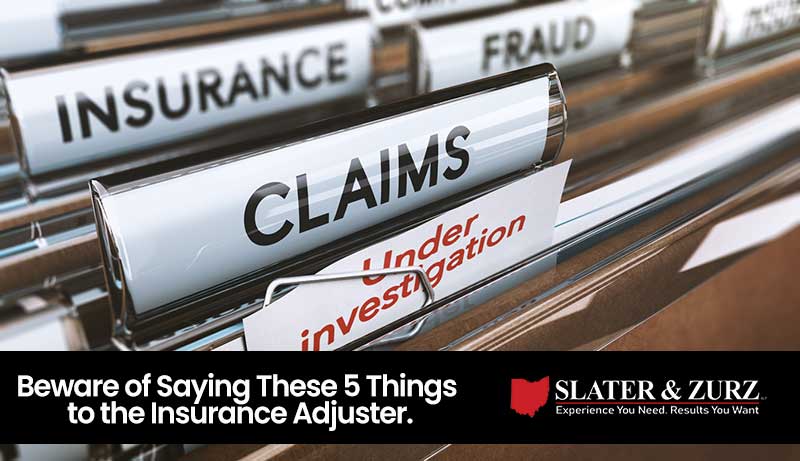One of the familiar characters who appears in any insurance claim is the insurance adjuster. Shortly after you file a claim for compensation against an insurance company, the adjuster will contact you as they proceed to investigate your claim.
While an adjuster from your own insurance company may be pleasant to interact with, it can be a different experience when you deal with another company’s adjuster.
The adjuster’s purpose is simple: They investigate claims filed with their company and evaluate the cheapest and most efficient way to resolve them. This does not always, or even often, mean paying the claim for the amount requested. Instead, the adjuster might either offer a lowball settlement and hope you accept it or deny the claim entirely.
Adjusters investigate claims by looking at police reports, inspecting medical records and damaged property, and talking with you. Your statements to the adjuster can be used to limit or deny your insurance claim, so you must be mindful of what you tell them.
5 Things Not to Say to the Insurance Adjuster
You will likely have to talk to the insurance adjuster at some point in order to move forward with your claim.
Having a personal injury attorney at your side can help keep you from making comments that harm your claim. However, if you must speak to the insurance adjuster without your personal injury lawyer present, be cautious and do not say any of these five statements:
1. “It Was My Fault”
First, do not admit or suggest in any manner that the accident was somehow your fault. Ohio is a fault-based state for insurance purposes, which means that the party who was predominately at fault in causing an accident is the party whose insurance must pay compensation.
By admitting you are at fault for causing the accident, you are giving the adjuster all the information they need to deny your claim.
It is not just saying you were at fault that is problematic. Admitting to any negligent act, such as speeding or using your cell phone, can lead the adjuster to reduce the amount of compensation the insurance company is willing to pay.
2. “I’m Not Sure, but I Think …”
The adjuster will likely ask you to provide an oral statement about how the accident occurred. While the better practice is to tell the adjuster that you will have your personal injury lawyer call them back, if you do talk to the adjuster, you should only provide information of which you are 100 percent certain.
The adjuster will try to push you for any details on the accident that you might remember. It is natural to want to be helpful, so you might be tempted to answer based on your best guess of what happened.
But even if you say you are not sure about a particular detail, the adjuster will treat it as if you were completely confident in its accuracy. If this detail contradicts a previous statement you made or if it is disproved by other available evidence, the adjuster can use this discrepancy to deny or reduce your claim.
3. “I Was Not Hurt That Bad”
Be careful when discussing your physical and emotional injuries with the adjuster. Even after you have spoken with a doctor or therapist and received a diagnosis, that diagnosis may change, and your condition may worsen. Or subsequent testing may reveal that the initial diagnosis was incorrect.
An adjuster may deny a claim for compensation if the injuries you report suffering in the accident are not those typically encountered in that sort of accident.
Under no circumstance should you tell the adjuster that you are “fine” or that you are doing “okay” after the accident. The adjuster could use this statement as an admission that you did not suffer any injuries in the accident and reduce or deny your claim.
4. “Of Course I Will Sign a Medical Records Release!”
When discussing your injuries, the adjuster may ask you to sign a release so they can access your medical records. With the way that some adjusters phrase this request, you might think that the adjuster is only interested in your medical records regarding the injuries you suffered in the crash. This assumption is wrong.
In making this request, the adjuster wants access to all of your medical records. This would allow the adjuster to scour your medical history and look for other conditions with which you have been diagnosed over the years that could explain your present injuries.
An injury you suffered in a car accident is compensable through an insurance claim; however, a preexisting back injury that may or may not have been exacerbated by an accident might not be compensable.
Refuse to sign any release for any records until you have spoken with a personal injury lawyer.
5. “I Accept Your Settlement Offer”
If the adjuster believes your claim should be paid, they will attempt to save their company the time and expense of litigation by making you a settlement offer. This offer may be too low to adequately compensate you for your losses. If you accept a low settlement offer, you could be left having to pay any uncovered costs yourself.
Instead, tell the adjuster that you will discuss their settlement offer with your attorney. Your injury lawyer will then advise you on whether the offer is appropriate for your case. If it is not, they can help you seek a larger settlement.
Why You Need a Personal Injury Attorney’s Help to Deal with an Adjuster
Dealing with an insurance adjuster after filing a claim can be nerve-racking, especially because your ability to obtain compensation could depend on the answers and information you give them. For this reason, you should contact Slater & Zurz and retain one of our highly qualified lawyers to help you speak with the adjuster.
Our firm has decades of experience representing injury victims and helping them obtain compensation. We will use that same experience to assist you in your claim. Call our office today at (888) 534-4850 to speak with a knowledgeable personal injury lawyer.






